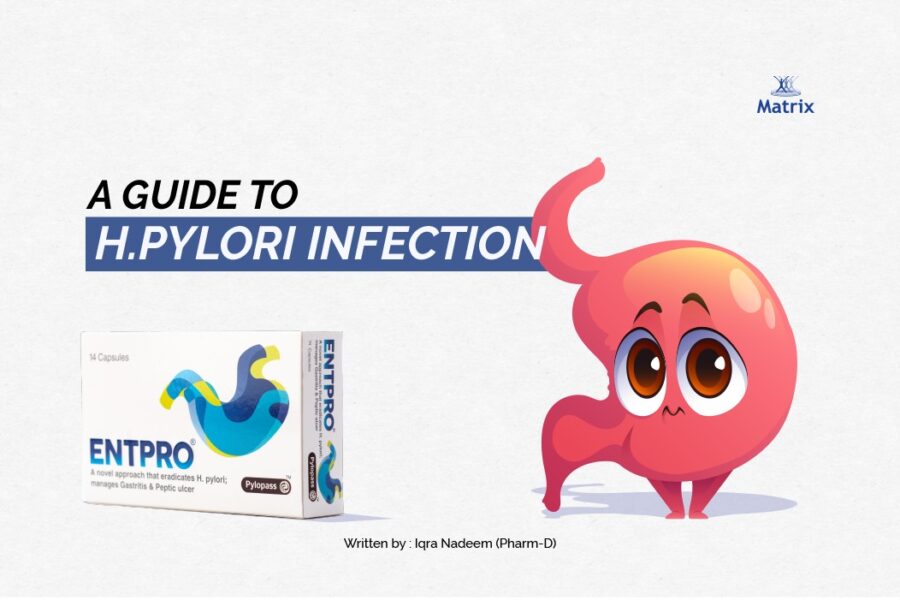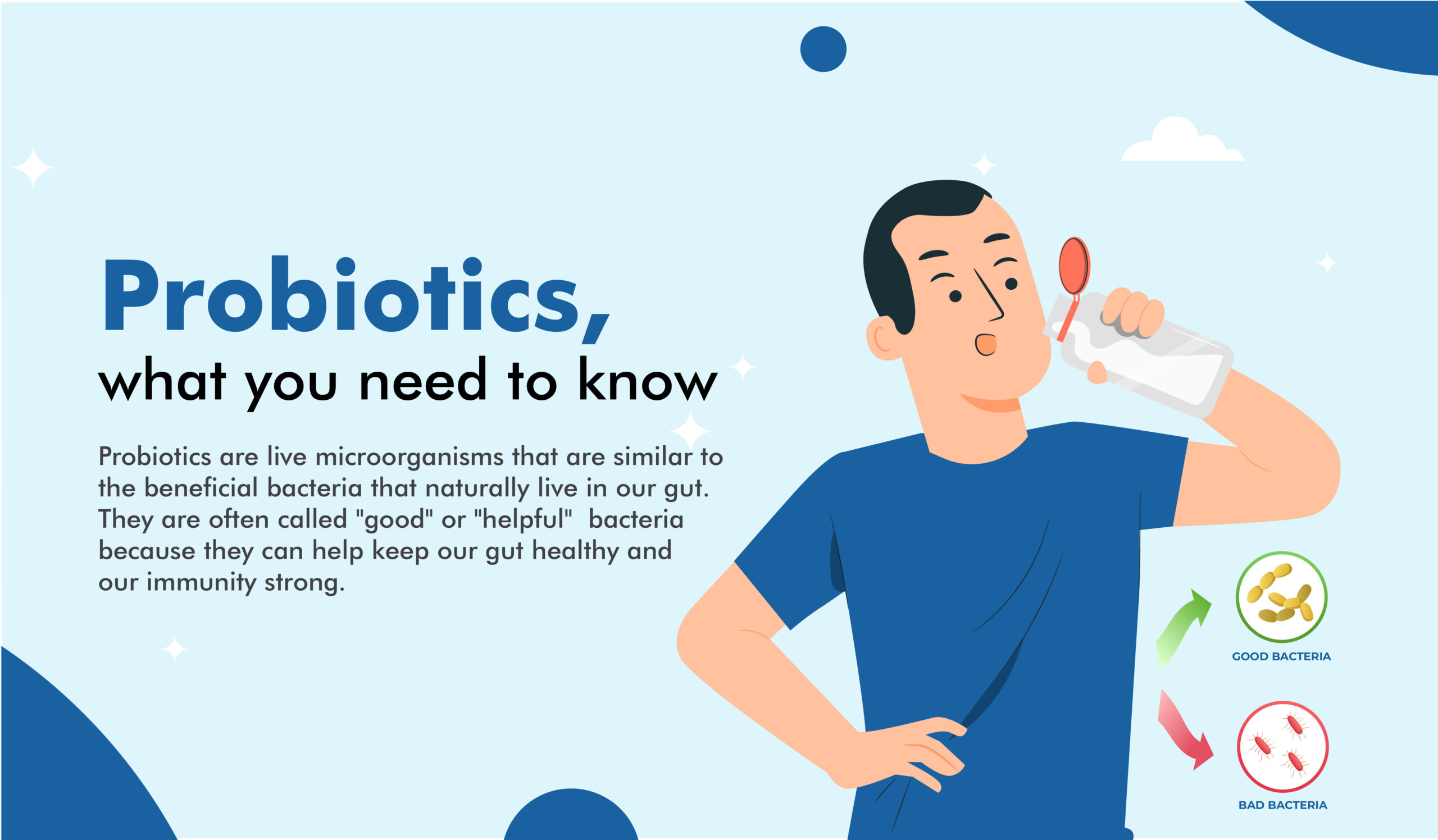
Probiotics are live microorganisms and/or yeasts that exist naturally in your body. Both good and bad microorganisms constantly invade your body.
In this article, you will learn about the difference between prebiotics and probiotics.
When you have an illness, your body absorbs more harmful bacteria, which upsets the balance of your system.
Good bacteria aid in the elimination of excess evil bacteria, restoring equilibrium. Probiotic supplements are a method to replenish your body with beneficial microorganisms.
What are probiotics?
Probiotics are live helpful microorganisms or yeasts that naturally exist in your body. People commonly think of bacteria as something that makes you ill. However, two types of bacteria continually infect your body: healthy bacteria and bad bacteria.
Probiotics are beneficial microorganisms that help keep your body healthy and functioning properly. These beneficial bacteria benefit you in a variety of ways, including fighting off harmful bacteria when you have an abundance of it and making you feel better.
Probiotics are a component of a broader picture of microorganisms and your body known as your microbiome. Consider a microbiome to be a varied group of organisms, similar to a jungle, that collaborates to keep your body healthy. Microbes are the members of this society. Trillions of microorganisms live on and in your body. A microorganism consists of:
- Bacteria.
- Fungi (including yeasts).
- Viruses.
- Protozoa.
Where do helpful probiotics (microbes) reside in my body?
Though your gut, namely your large intestines, is the area most frequently associated with healthy microorganisms, your body also contains good microbes in a number of other places.
- Gut.
- Mouth.
- Vaginal tract.
- Urinary system.
- Skin.
- Lungs.
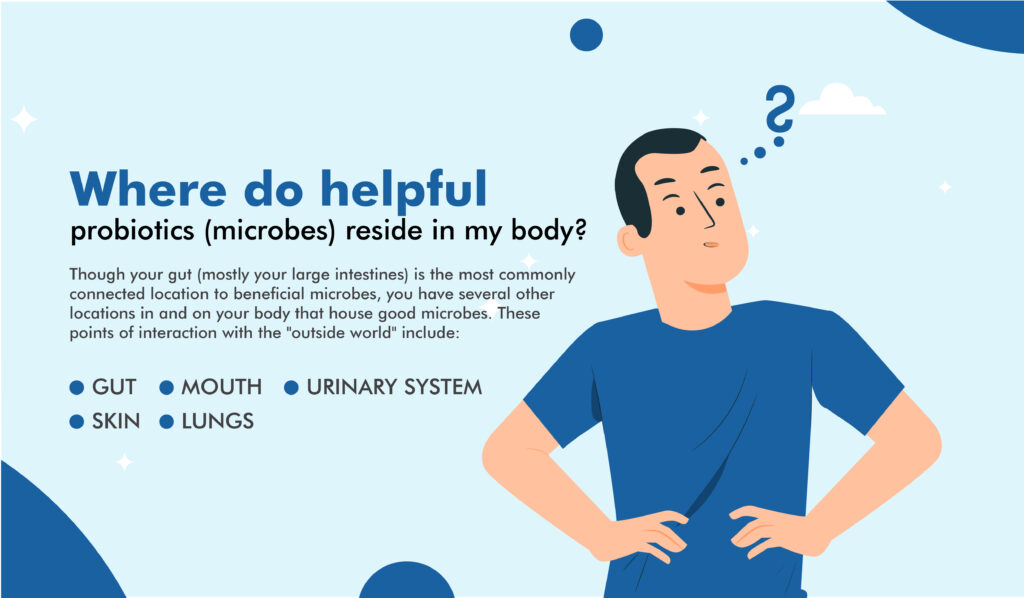
How do probiotics work?
The primary function of probiotics, or good bacteria, is to keep your body in a healthy equilibrium. Consider it like keeping your body in balance. When you are sick, bad bacteria penetrate your body and multiply. This throws your metabolism out of order.
Good bacteria fight off bad bacteria and restore equilibrium within your body, making you feel better.
Good bacteria maintain your health by boosting your immune system and reducing inflammation. Certain kinds of beneficial bacteria can also:
- Assist your body in digesting meals.
- Stop bad bacteria from multiplying and making you ill.
- Make supplements.
- Assist the cells that line your gut in preventing bad bacteria from entering your blood that you may have ingested (via food or drink).
- It is important to digest and absorb the medication.
This balancing act occurs organically in your body all the time. It is not necessary to consume probiotic supplements to achieve this. Good bacteria is a natural component of your organism. Eating a well-balanced, fiber-rich diet on a daily basis helps to maintain appropriate levels of good bacteria.
Which probiotic microorganisms are the most common?
There are many different types of bacteria that can be called probiotics, there are two types of bacteria that are commonly found. These are some examples:
- Lactobacillus.
- Bifidobacterium.
Probiotics contain beneficial yeast. The most prevalent yeast found in probiotics is:
Saccharomyces boulardii is a type of yeast.
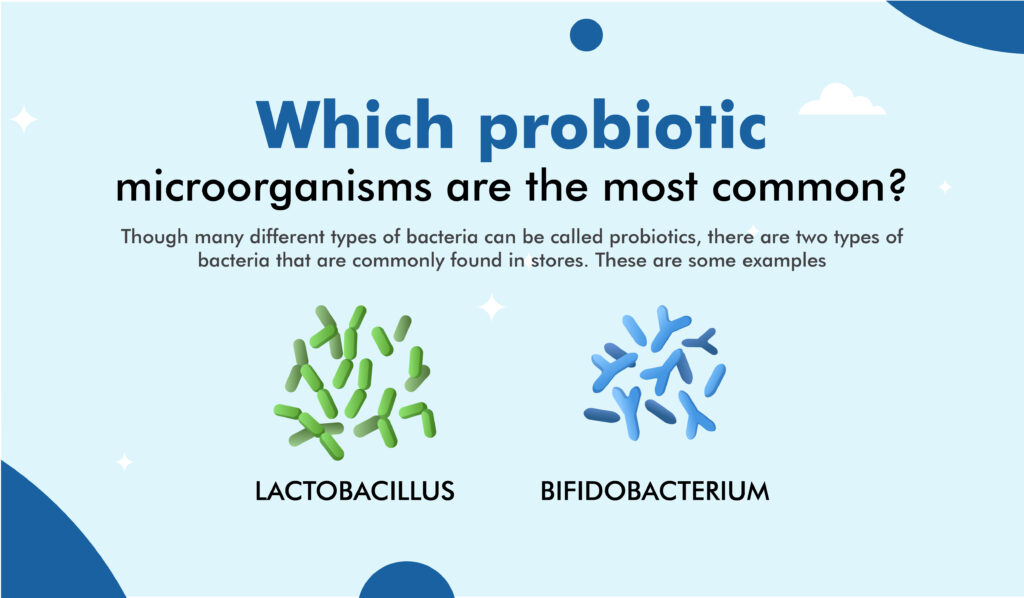
Can probiotics be used to treat physical conditions?
There is presently a great deal of research being conducted on the topic of what probiotics can do for your body. Despite the numerous potential benefits, researchers are still working to find clear answers about how probiotics can help with various conditions.
However, probiotics may be beneficial in certain medical situations. This varies from person to person, so what works for one individual may not work for another. These can also differ depending on the bacteria used.
Increasing the number of probiotics in your body (via food or supplements) may help with the following conditions:
- Diarrhea (both antibiotic-induced diarrhea and Clostridioides difficile (C. diff) illness).
- Constipation.
- Bowel inflammation (IBD).
- Irritable bowel syndrome (IBS).
- Infections with yeast.
- UTIs are infections of the urinary system.
- Dental illness.
- Lactose allergy.
- Eczema (atopic dermatitis).
- Infections of the upper respiratory system (ear infections, common cold, sinusitis).
- Sepsis (specifically in infants).
Can I take or eat something to increase the good probiotics (microbes) in my body?
Foods, drinks, and supplements can help you boost the quantity of good microbes in your body. You may already consume probiotic-containing foods on a regular basis. Fermented foods, in particular (yogurt and pickles), are home to a plethora of beneficial microorganisms. Fermented beverages such as kombucha (fermented tea) and kefir (fermented dairy drink) can also add probiotics to your diet.
Probiotics can also be added to your nutrition through dietary supplements, in addition to food. Because these are not drugs, they do not need to be authorized.
Before beginning any supplement or making significant dietary changes, always consult with your healthcare provider.
Prebiotics vs Probiotics…what’s the difference?
Both prebiotics and probiotics are linked to gut health, but they serve different purposes.
Probiotics are live microorganisms that, when consumed in sufficient quantities, provide health advantages. They are often referred to as “good bacteria” and are found naturally in fermented foods like yogurt, kefir, sauerkraut, and kimchi. Probiotics can also be taken as supplements and are believed to help improve digestive health, boost the immune system, and reduce inflammation.
Prebiotics, on the other hand, are nondigestible fibers that provide food for probiotics. They help promote the growth and activity of good bacteria in the gut.
Prebiotics are found in many plant-based foods like bananas, onions, garlic, chicory root, and whole grains.
In summary, probiotics are live bacteria that directly benefit the body, while prebiotics are fibers that indirectly support the growth and activity of probiotics. Together, they play an important role in maintaining a healthy gut and overall well-being.
Can I get probiotics from food?
The foods you eat can definitely increase the beneficial microbes in your body. Certain foods contain probiotics (good bacteria) that can improve the wellness of your microbiome.
These foods can be added to your nutrition at any time of day. You may even be eating them on a daily basis and be unaware that they contain probiotics.
Here are a few examples of probiotic-rich items that you can incorporate into your diet and experiment with:
Breakfast:
- Yogurt.
- Buttermilk.
- Bread made with sourdough starter.
lunch:
- Cottage cheese is a type of cheese.
- Kombucha.
- Tempeh.
Dinner:
- Sauerkraut (Sauerkraut is a type of fermented cabbage)
- Kimchi.
- Soup with miso.
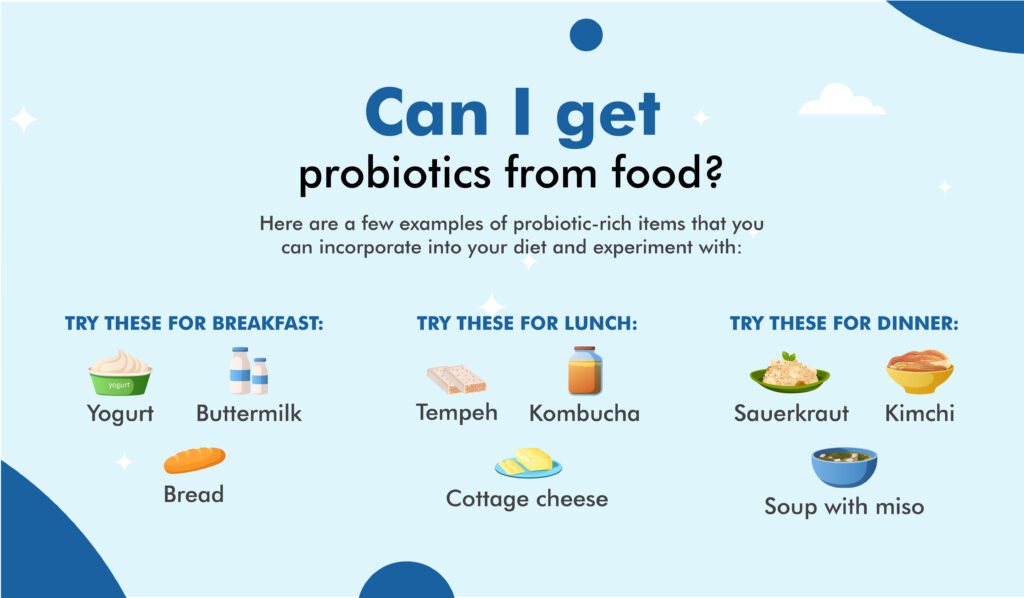
Make certain that you continue to prepare a balanced and healthy meal each time you sit down to consume. Though including probiotic-rich foods in your diet will not harm you, equilibrium is still essential. Your body loses the advantages of other food groups when you eat too much of one meal.
How do I take a probiotic supplement?
There are several ways to absorb probiotic supplements. They come in a variety of shapes, including:
- Foods.
- Drinks.
- Pills or capsules.
- Powders, we have PREPRO-gg and PREPRO_Z.
- Liquids, we have ready-to-drink probiotics with the name Ospor and Proflor.
You can combine probiotics and prebiotics. Prebiotics are complex carbohydrates that feed the bacteria that live in your digestive system. Prebiotics are basically “food sources” for beneficial bacteria. They contribute to the well-being of good bacteria by feeding them. Inulin, pectin, are examples of prebiotics.
PREPRO-GG is a probiotics supplement that contains a unique probiotic strain Lactobacillus rhamnosus GG.
PREPRO-GG promotes a healthy balance of bacteria in the intestines. In both children and adults, it lowers the risk of diarrhea and gastrointestinal illnesses. Additionally, it strengthens the immune system and lowers the risk of respiratory tract infections.
It is recommended to take 1-2 Sachets per day or as advised. PREPRO GG® may be taken with or without food.
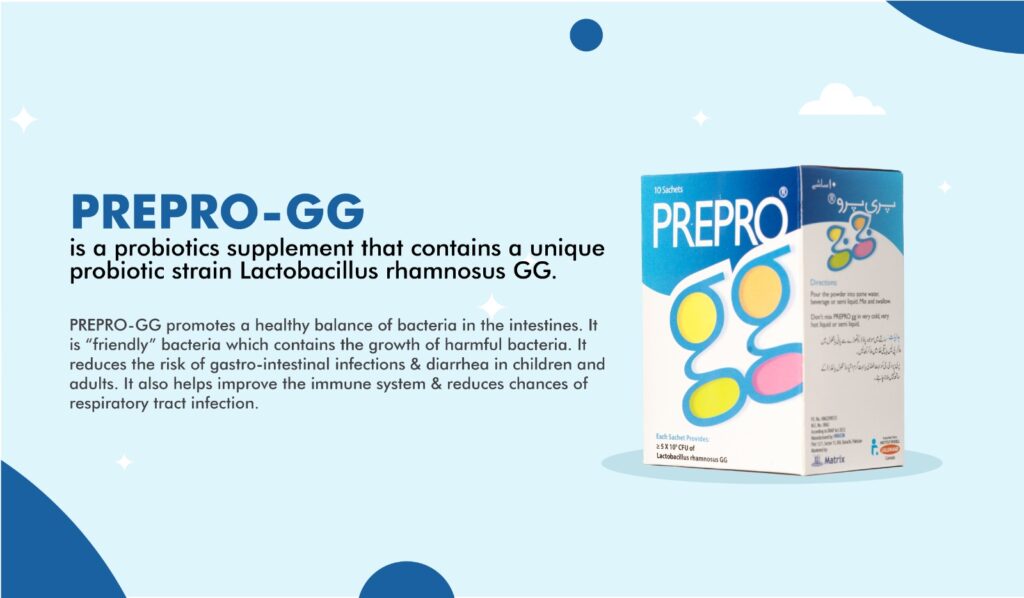
PREPRO Z is a unique combination of Lactobacillus rhamnosus, lyophilized Saccharomyces boulardii & Zinc enriched yeast which is highly effective for acute, bacterial, & viral diarrhea, antibiotic-associated diarrhea & IBS (Irritable bowel Syndrome). It helps to inhibit the development of pathogenic microorganisms and rebuild a beneficial intestinal flora & also supports immune health.
It is recommended to take 2-3 Sachets per day or as advised. PREPRO® Z may be taken with or without food.
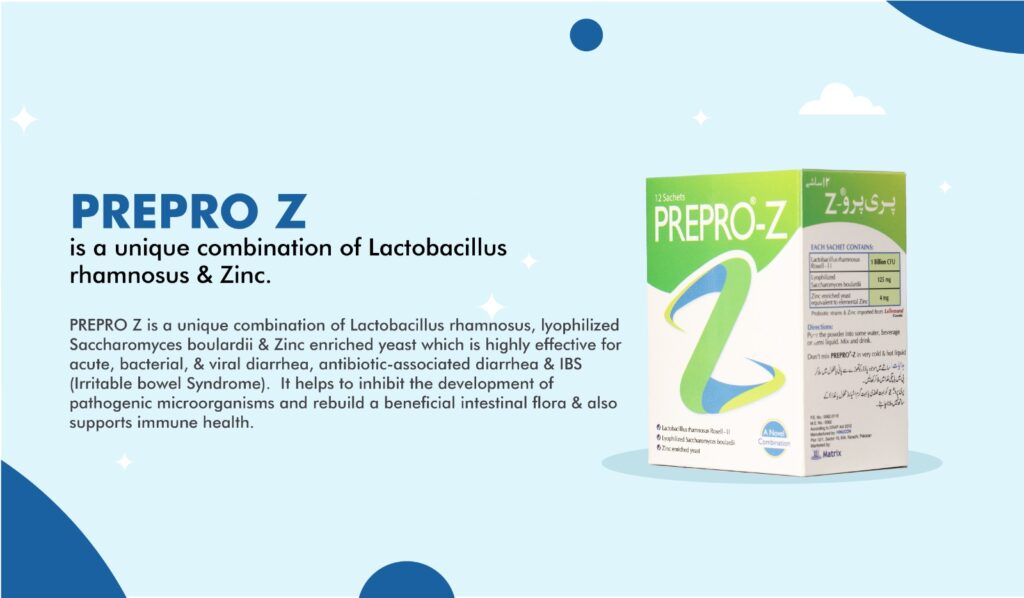
Should I give probiotics to my kids?
Probiotics can benefit both adults and children. If your kid has an illness that needs antibiotic treatment, taking a probiotic can help shorten the duration of the illness. Probiotics can also assist children with constipation, acid reflux, diarrhea, gas, and eczema.
Including probiotics in your child’s diet through food is usually a safe method to do so. Yogurt and cottage cheese are common components of a well-balanced diet and can provide beneficial bacteria with little danger.
Commercially available probiotic supplements for infants and toddlers are available. However, before giving your kid any probiotic supplement or changing their diet to include probiotic-rich foods, consult with their pediatrician.
FAQs
Is PREPRO GG® safe for children?
PREPRO GG® is prescribed by physicians to all age groups of people. It is also easy to ingest for children.
Does PREPRO GG® need to be stored in a refrigerator?
No, it doesn’t need to be stored in a refrigerator.
Can I take PREPRO GG® when I am on antibiotics?
LACTOBACILLUS RHAMNOSUS GG can be taken with antibiotics if prescribed by the doctor. However, you are advised to maintain a gap of 2 hours between LACTOBACILLUS RHAMNOSUS GG and antibiotics.
Are there any side effects of PREPRO Z®?
Although no immediate side effects are known, PREPRO Z is thought to be safe for most people.
References:
https://www.webmd.com/digestive-disorders/what-are-probiotics
https://my.clevelandclinic.org/health/articles/14598-probiotics


